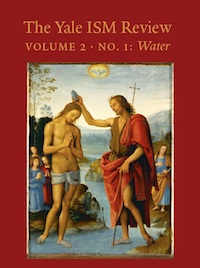Michelle Lewis
We each made our solemn march to the places that had been designated for us. I watched as those who were going to sit took tentative steps toward their chairs. Others stood silently toward the back of the canopy. It was as though they were trying to will themselves as far away as they could from the open hole in the ground.
They had gathered here to pay their last respects to one they knew and loved as son, brother, father, and friend. He loved the ocean, and anything that was related to the water. It was imperative that the ritual that day include water. He didn’t just love rivers and streams and lakes and oceans, he loved the rain. His last promise to his now five-year-old daughter was that they would play in the rain that summer. He died before that could happen.
His mother was a devout Christian and it was important for her that this element of playing in the rain be turned into a liturgy that could be both playful and respectful—something that both the children and adults could participate in. Connections between play and worship are not unknown: Diane Ackerman writes that play “. . . carries us across fear and uncertainty toward the slippery edges of possibility, where one must use oneself fully and stretch human limits to achieve the remarkable . . . .”[1] This was where the liturgy needed to take all of us. Not just the children, but the other family and friends that would gather. This was where the liturgy needed to take me, as their pastor, as well.
It was my third funeral in about two weeks. I looked at the somber faces of those who gathered to pay their last respects, and thought back to the death of my own sister only a month before. When I was called to do this, a part of me wanted to say no. But there was a part of me that wanted to say yes. I knew today we would be confronting death and its hold, which was both invisible and tangible.
When I was asked to do this, I thought back to the last time I had played in the rain. It was in the summer of my first year of graduate studies at Yale. Taking a break from my research that day, I decided to go to a Sunflower Farm. The afternoon started out idyllic. The scene was as picturesque as something out of a novel. The sunflowers were in bloom and stretched as far as the eye could see. They were offering hayrides. I had never been on a hayride and thought this would be a great day to give one a try. I joined the group of women and children in a wagon and took in the sights and smells around me. It was a beautiful summer day. The wagon took us through a meadow and into a forest.
We were about fifteen minutes into the hayride when the sky became ominously dark. It began to rain. It wasn’t a light summer rain or a passing shower. It was a torrential downpour. Some of the children screamed in delight while their mothers tried to shield their heads and cameras from the rain that wouldn’t stop. Our peaceful mood was shattered. The person driving our wagon scrambled to find the shortest route back to where the trip started. I thought about the irony of it all. A day that had started with such hope and beauty had ended, for many, with some type of destruction. More than one person would have to replace a cell phone or a water-logged camera.
As we finally made it back to the place where we’d started the journey in our wagon, the sky began to clear and the rain stopped. We knew it wouldn’t rain forever, but while we were in that moment, as the rains were pouring down on us, it felt like forever.
Despite the havoc, I experienced the rain that day as cleansing. As we waited our turn to get off the wagon one of the ladies sitting next to me looked at me and said, “Well that was something else,” and we laughed. It wasn’t a small chuckle, but one of those laughs that comes from deep down in the pit of your belly. It was one of those laughs that reach your very soul. Before I knew it, I was standing and laughing with this woman whom I’d only just met and we were laughing so hard we were crying.
This is the power of water. It can be both devastating and life-creating. A day doesn’t go by that we don’t experience its life-giving power in some way, whether through the leaves on a tree, or plants in a garden, or through drinking and bathing. Water carries us through birth, and through the rebirth of baptism. At its worst, water can be destructive. At its best, it is cleansing.
I hoped the people sitting before me would be renewed and refreshed by the funeral liturgy that was about to take place. We said prayers and read scripture. Then, using the water that the family brought in from a stream from their family farm, we used a seashell to make it rain, scooping the water up in the shell and throwing it up in the air. With each shower of raindrops we said the words, “We remember you.” Children giggled, adults laughed and smiled, some wiped tears from their eyes. All were cleansed by the gentle raindrops. Instead of causing destruction that day, the rain was cleansing, as it washed away our pain and terror and fear.
There is pain and fear in losing a loved one: The pain of realizing you will never again have that person to walk with or cry with; the fear of knowing you must face a new day without them. There is also a terror in acknowledging death itself, and realizing that each of us meets the same end. Yet that day we laughed. We laughed fearlessly in the face of death, and we were cleansed as we played in the rain.
 Michelle Lewis is the Senior Pastor at Catskill United Methodist Church in Catskill, New York. She is passionate about the intersection of religion and the environment, as well as helping people and communities reach their full potential through creativity that engages the spiritual and the natural worlds. She is an award winning filmmaker and hosts a radio show that examines connecting our spirituality with daily life. Michelle is the first woman of color to hold joint Master’s degrees in Religion and the Environment from Yale. You can learn more about Michelle’s work at MichelleEstelleLewis.com
Michelle Lewis is the Senior Pastor at Catskill United Methodist Church in Catskill, New York. She is passionate about the intersection of religion and the environment, as well as helping people and communities reach their full potential through creativity that engages the spiritual and the natural worlds. She is an award winning filmmaker and hosts a radio show that examines connecting our spirituality with daily life. Michelle is the first woman of color to hold joint Master’s degrees in Religion and the Environment from Yale. You can learn more about Michelle’s work at MichelleEstelleLewis.com
FOOTNOTE
[1] Bonnie J. Miller-McLemore, ed. Wiley-Blackwell Companion to Practical Theology (West Sussex, UK: Blackwell Publishing Limited, 2012), 42.
This material is licensed under a Creative Commons Attribution 4.0 License.
Recommended Citation: Lewis, Michelle. (2015) “The Rain: A Funeral Story,” The Yale ISM Review: Vol. 2: No. 1, Article 13.
View article as a PDF: The Rain a Funeral Story
